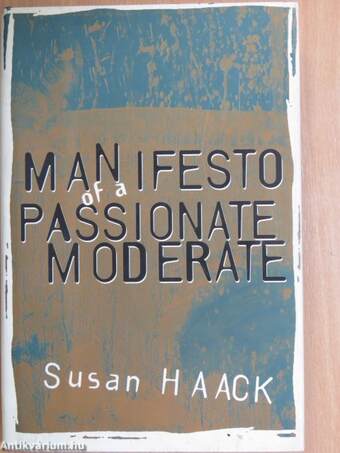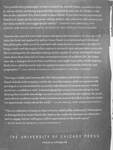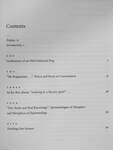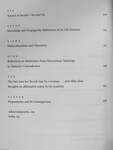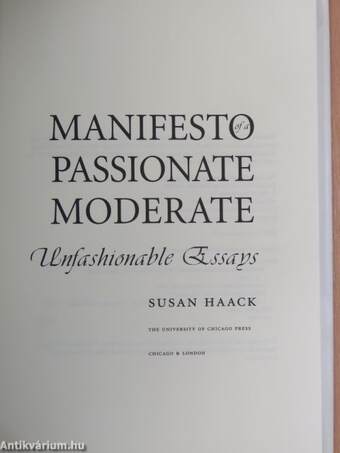1.066.456
kiadvánnyal nyújtjuk Magyarország legnagyobb antikvár könyv-kínálatát

VISSZA
A TETEJÉRE
JAVASLATOKÉszre-
vételek
Manifesto of a Passionate Moderate
Unfashionable Essays
| Kiadó: | The University of Chicago Press |
|---|---|
| Kiadás helye: | Chicago |
| Kiadás éve: | |
| Kötés típusa: | Félvászon |
| Oldalszám: | 223 oldal |
| Sorozatcím: | |
| Kötetszám: | |
| Nyelv: | Angol |
| Méret: | 24 cm x 16 cm |
| ISBN: | 0-226-31136-8 |
naponta értesítjük a beérkező friss
kiadványokról
naponta értesítjük a beérkező friss
kiadványokról
Fülszöveg
"Is it possible for a philosopher to have a vvicked wit, a kindly heart, a passión for clari-ty, and an utterly convincing argument that crossword puzzles are, for thinkers, what labs are for scientists? It is, if her name is Susan Haack. If you have not yet experienced Haack s wit, heart, clarity, and puzzle-solving abilities, this collection will convince you thatthese wordsdo notexaggeratehertalents—robert heilbroner,new
school for social research, author of the worldly philosophers
"Anyone who cares for truth and reason, and appreciates trenchancy in criticism, will value this book and applaud its author. Susan Haack is an epistemologist who holds that philosophy, while not to be confused with natural science, resembles the latter in being a truth-seeking enquiry which aspires to as much rigor and precision as possible. She is consequently the uncompromising enemy equally of certain fashionable skepti-cisms about these aims and of somé current perversions of academic life.... Tovább
Fülszöveg
"Is it possible for a philosopher to have a vvicked wit, a kindly heart, a passión for clari-ty, and an utterly convincing argument that crossword puzzles are, for thinkers, what labs are for scientists? It is, if her name is Susan Haack. If you have not yet experienced Haack s wit, heart, clarity, and puzzle-solving abilities, this collection will convince you thatthese wordsdo notexaggeratehertalents—robert heilbroner,new
school for social research, author of the worldly philosophers
"Anyone who cares for truth and reason, and appreciates trenchancy in criticism, will value this book and applaud its author. Susan Haack is an epistemologist who holds that philosophy, while not to be confused with natural science, resembles the latter in being a truth-seeking enquiry which aspires to as much rigor and precision as possible. She is consequently the uncompromising enemy equally of certain fashionable skepti-cisms about these aims and of somé current perversions of academic life. She stages, inter alia, a dialogue between Peirce and Rorty; and might even, rather freely adapting Bürke, have called her entire tract'An appeal (or reproach) from the old to the new pragmatists.'"—sir peter strawson, university college, oxford
"Hewing a middle path between the Old Deferentialists and the New Cynics, Susan Haack defends with exemplary ciarity the view that science, while not epistemically privileged, is an extraordinarily successful embodiment of rational inquiry: neither sacred nor a confidence trick.'Acknowledging that science is a social enterprise, but denying that scientific knowledge is a mere social construction, she analyzes the social and political conditions under which scientists are more or less Iikely to discover truths (or approximate truths) about the world."—alan sokal, new york university
"This is a collection of essays in what is loosely called public philosophy.' Philosophers as distinguished as Susan Haack who deplore the trends she discusses are often reluc-tant to engage, but her willingness will be appreciated, for the need is great" — ruth barcan marcus, yale university
THE UNIVERSITY OF CHICAGO PRESS
www. press. uchicago. edu Vissza
Témakörök
- Filozófia > A szerző származása szerint > Angol
- Idegennyelv > Idegennyelvű könyvek > Angol > Filozófia > Nemzetisége szerint > Angol
- Filozófia > Témaköre szerint > Tanulmányok, esszék
- Idegennyelv > Idegennyelvű könyvek > Angol > Filozófia > Témaköre szerint > Tanulmányok, esszék
- Filozófia > Témaköre szerint > Társadalomfilozófia > Egyéb
- Idegennyelv > Idegennyelvű könyvek > Angol > Filozófia > Témaköre szerint > Társadalomfilozófia > Egyéb



